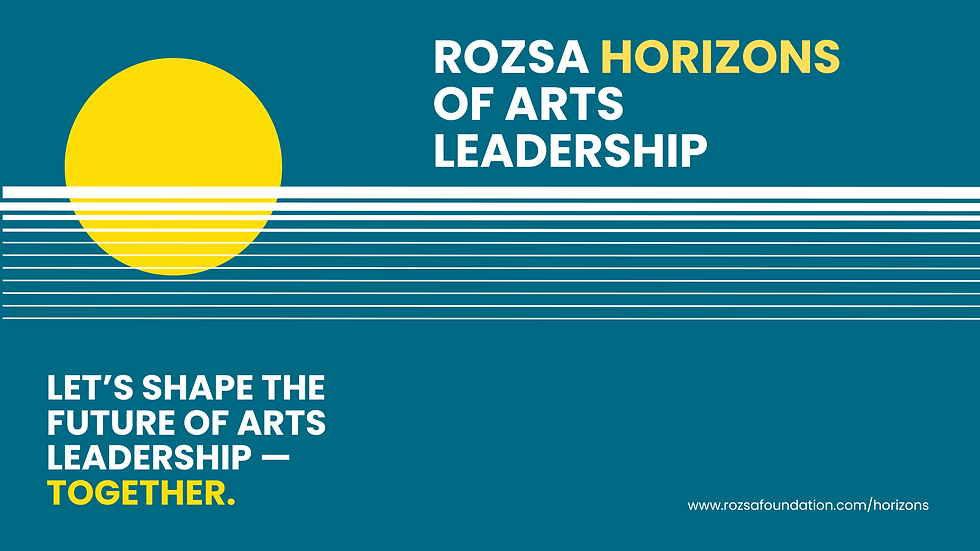The Ongoing Development of the Rozsa Arts Management Program (RAMP)
- Rozsa Foundation
- Jul 28, 2021
- 4 min read
Updated: Aug 10, 2022

by Lisa Mackay
The 2021-2022 Rozsa Arts Management Program (RAMP) session begins at the end of September 2021, and Arts Leadership Director Geraldine Ysselstein is eager to continue building on the many changes that were introduced in this past year. For the first time, the program incorporated facilitators from the arts and non-profit communities alongside Haskayne instructors. "There is so much to learn from those in our community with practical experience, along with the business expertise of the Haskayne faculty," professes Geraldine. "What makes this program special is that mix of experience and instruction from the best in every field." Another change was the fully-online format. “Moving online was a big step for us in the last session,” she explains. “It required a lot of coordination and collaboration with the University’s Haskayne School of Business, a lot of planning, and increased reliance on technology.” The outcomes from these changes were very positive and both the online format and the mix of instructors will be carried forward in the upcoming 2021-2022 session. The feedback from participants highlighted their effectiveness. “Zoom was a huge benefit for this program – saved hours of travel (in winter) and essentially made participation possible from outside Calgary,” said one participant. “I was extremely grateful for the technology.” Another reported that “The topics were covered by great speakers in ways that solidified my understanding of all aspects of the arts sector.” “I especially appreciated the financial session. Even when I knew a lot about the information presented in a session, this program helped formalize my understanding.” This is exactly what Geraldine hopes participants can get out of taking the program. “There are so many facets to arts management, and people bring enormously varied experience with them to the program,” she explains. “The objective in putting the program together the way we have is to honour and strengthen the knowledge and confidence that participants have and fill in any gaps with practical and academic expertise.” Another evolving improvement to the program is the growing focus on anti-racism and Indigenous world views. “These topics and approaches are integral to our work in the arts now and moving forward,” explains Geraldine. “In 2020-21 we incorporated Indigenous worldviews into the program with the session led by Naheyawin, and incorporated an anti-racist focus into our community engagement, governance, and advocacy sessions. In the upcoming 2021-2022 program, we are working with the Haskayne School to ensure that a de-colonialist mindset is incorporated into each and every session, and that it guides the program. I feel it is imperative that arts leaders now and in the future be working with an awareness and understanding of these topics and as a sector we can be agents of positive change.” This sentiment was echoed by participants. As one participant shared, “this session has inspired me and made me think about different ways in which I could work towards ensuring and providing a culturally sensitive, enhancing and inclusive environment for all artists and employeers in our organization." Both the Rozsa Foundation staff and University of Calgary’s Haskayne School staff are energized by the developments in the program. Kailey Armstrong, Manager of Learning and Development Programs with the Haskayne School of Business felt that the approach to program outcomes outlined by Geraldine below really resonated: "Let’s lead by example. Let’s be equitable. Let’s celebrate diversity. Let’s be inclusive. Let’s be accountable. Let’s show what’s possible. Let’s open the door to uncomfortable conversations. Let’s make it meaningful and impactful. Let’s be humble. Let’s recognize the harmful impacts of racism and colonialism and how that appears within our respective organizations and artistic practices. Let’s do better."
By integrating this approach with incremental adjustments to the delivery of the program, RAMP will continue to be the leading source of arts management professional development in the city/province. “It is a lot of fun and so worth it. The content of RAMP is essential to those in arts administration,” enthused one participant. “I have been in many seminars where the “business lens” is demonstrated to non-profits,” shared another. “Usually it is patronizing, there is a fundamental misunderstanding of our industry by the presenter, and there is a dichotomy established between the good for-profit strategizes, and the poorly run non-profit model. This was not that at all! I found all of the presenters and faculty really knew the non-profit arts landscape and could effectively communicate new strategies in a helpful and inspiring way.” “The RAMP program offered me a valuable structure to renew my relationship to being an arts worker,” enthused a third participant. “From being in a state of deliberate divestment from working in organizations, now my heart and imagination are beginning to see different ways of engaging and contributing to meaningful change.” As we emerge from over a year and a half of pandemic life, the responsibilities and challenges of arts managers continue to evolve. It is Geraldine’s intention that Rozsa programs such as the Arts Management Program help arts managers connect with instructors and facilitators, reflect evolving best practices, and especially connect with peers who are facing the same demands and challenges, to strengthen and support each other’s work. “Having so much interaction with other arts professionals has been a much-needed reality check,” read one of the evaluations we received this year. “ We work so hard, and often in such patchwork ways, to move our mandates forward. It was great to just have the opportunity for honest conversations with so many people in the same boat as me." Applications for the 2021-2022 session of RAMP close August 13, 2021. Visit rozsafoundation.org/ramp to learn more and apply. Please email admin@rozsafoundation.org if you have any questions about the program.






Comments